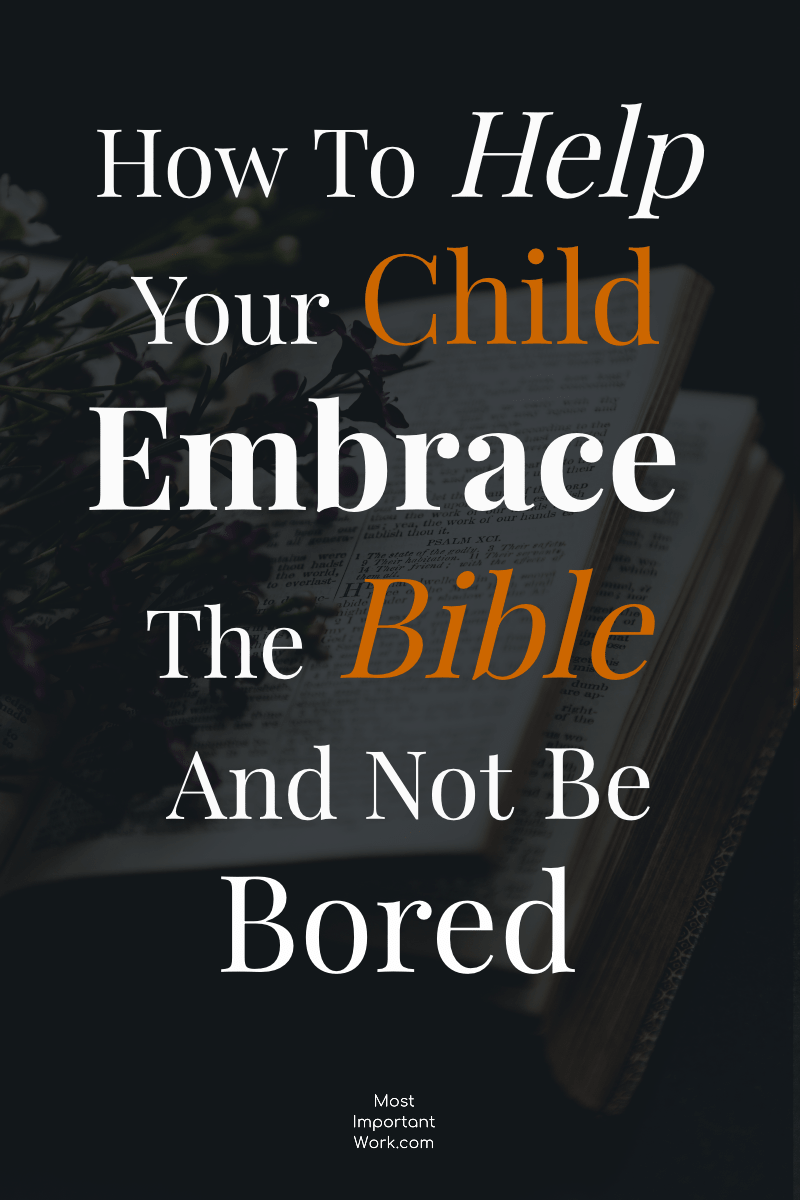Reading Time: 4 min 56 sec
If you watch any tv show, bible reading and church are depicted as activities to be endured. The lead characters are typically dragged to church by well-meaning mothers and grandma’s, more out of a sense of social obligation and tradition, than out of a love for Jesus.
We snicker as dads make jokes about covertly falling asleep at church, bored to death by the pastor’s dry sermons. And we start to internalize the message that the things of God are boring.
We like to invest in activities that give us results. We live in a culture where Christianity commonly is portrayed as an emotional prop for unenlightened. Every day we are assaulted by the seemingly innocuous messages that the things of God are dry lectures to be endured.
It is no wonder we worry that by bringing our child to church every Sunday and making them read the Bible, that it could turn them off to the whole idea of Christianity. We worry that the Bible will seem boring or confusing to our child.
As parents who desire to follow Jesus, it is normal to have questions. We understand that the stakes are high, and we do not want to fail in raising our kids to know and love God.
Here are three simple steps to help your child embrace the Bible and not be bored.
1. Bible Reading: Your View
2. Bible Reading: The Goal
3. Bible Reading: Wonder Together

1. Bible Reading: Your View
What is your current experience of the Bible? Do you find it a boring task to be completed? A “should” that never seems to make it off your to-do list? Do you tune out when the Bible is read aloud? Does it seem dry, boring, or out of date? Or do you find it alive, powerful with fresh insights?
It is important to understand your feelings regarding your experience of scripture. Because your conscious (or subconscious) experience with the Bible directly influences your child’s perception of scripture. “Children imitate what they observe about beliefs, attitudes, and actions.” Vernie Schorr Love
If you desire that your child would love and engage in the living words of the Bible, then your experience with scripture has to change. You cannot lead from behind— you have to lead by example.
There is a great transformation that comes from weaving knowledge of and experience with God together. We cannot live our lives accumulating facts about God. We have to stop and give the Holy Spirit elbow room to speak to us.
Here is an exercise that will help you talk with God about your experience with scripture.
I would encourage you to not skip over the activity. When you take time to reflect, with God, powerful transformation happens! 🙂
Prayer Exercise
a. Open the notes section of your phone.
b. Take two minutes and start writing down words, phrases, or sentences that describe your current experience of God. Be brutally honest. Set your timer and fully engage in this exercise.
c. Now, glance over the words you have written. Does any word or phrase surprise you?
d. Share these insights with God. Spend some time silence, giving the Holy Spirit elbow room to speak to you.
e. Finish by sharing with him your desire for a new experience with his word.
2. Bible Reading: The Goal
I think a lot of us are confused about the goal of reading the Bible with our children. It can be easy to see scripture as a big book of rules, overflowing with cautionary tales. When we look at scripture through that lens, it is no wonder we worry that our children will see the Bible as boring.
I have also seen the Bible used as punishment for bad behavior. Is there anything that could suck the love of scripture out of your child more than being forced to copy a hundred verses of Proverbs 12:19, “Truthful lips endure forever, but a lying tongue lasts only a moment.”?
A lot of us assume that the primary goal of scripture is to show us how to live a moral life. And so, we treat the Bible purely as a manual for right living. And though that is partly true, it is not the full story.
Catherine Stonehouse and Scottie May, in their book: Listening to Children on the Spiritual Journey, unpack it this way,
“We do want children to know basic Biblical facts, but our ultimate purpose is so much bigger. We long to see them meet God and get to know God, not just know about God. Children experience God as they enter the stories of Scripture and see God in action, discovering God’s character as the story unfolds, and as they hear their self-revealing God speak to them in the narrative.”
The power of the Bible is that it not only shows, but allows us to experience God’s transforming presence in our lives. Scripture invites our children to embark on a love relationship with Jesus. It is only out of the foundation of a love relationship that true transformation can take place.
We have to remind ourselves that our goal is not to data dump our children with facts and figures about God, or to try and get extra brownie points in heaven because our child read through the Bible in one year.
The goal of reading the Bible with our children is to introduce them to a God who lavishly loves them. And out of that love relationship, through the power of the Holy Spirit, they come to know, experience, and follow him.

3. Bible Reading: Wonder Together
So how do we introduce our children to a loving God through the pages of scripture?
The secret to reading and engaging with the Bible is by wondering together. Seriously, this is a POWERFUL tool to help your child engage with God’s word (instead of check out).
Wondering is all about active participation in the words of God. It takes head knowledge and through the power of the Holy Spirit, and creates heart transformation. Wondering gives space to reflect, to internalize, and to allow the Holy Spirit to transform our souls.
So here’s how it works:
We read a Bible story or passage of scripture slowly. We invite our children to notice. To interrupt. To wonder.
I wonder why the disciples were so grumpy? I wonder if Jesus likes to eat ice cream? I wonder if Abraham tried to count all the stars in the sky?
Children at this stage of their development are very visual learners. They love looking at pictures and are masters at noticing the smallest detail. I almost always incorporate some sort of visual image into our daily time with Jesus. Visual images are an important part of engaging children in the practice of wondering.
So how in the world do you do it? Here are some simple steps you can use as you read the Bible with your children.
Scripture Exercise
- Pray and invite God’s presence. Ask him to speak to you/your children through the Biblical story.
- Read the Bible story or scripture passage slowly.
- Invite your child to interrupt and wonder along the way.
- Encourage your children to notice different images, words, or thoughts that come to mind.
- Spend some time wondering about the story or passage together.
- Close by praying and thanking God for his presence during this time.
If you want to know how to get started in living a deep life with God; grab our Deeper Life Beginners Guide (below). And join our community of moms who are hungry for more Jesus in their lives and in the lives of their families.
What about you? What is your #1 issue when it comes to teaching your child to love Bible reading? Leave a comment, and don’t forget to follow Most Important Work on Pinterest!
Latest posts by Most Important Work (see all)
- 3 Steps To A Spectacular Kid’s Ministry Group That Matters - May 31, 2024
- 14 Powerful Picture Books That Will Ignite Your Child’s Faith - May 31, 2024
- 7 Powerful Scriptures You Need To Pray Over Your Kids - October 26, 2020

